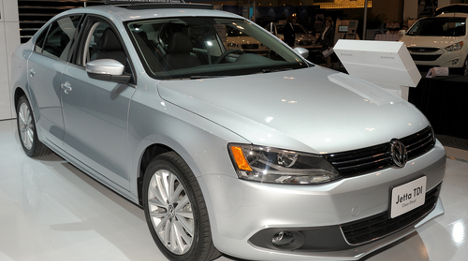EPA, Calif. say certain VW diesels violate Clean Air Act

The VW Jetta TDI, as shown here at the 2011 N.A. International Auto Show in Detroit, is one of several diesel-powered models the EPA claims violates the Clean Air Act.
By subscribing, you agree to receive communications from Auto Remarketing and our partners in accordance with our Privacy Policy. We may share your information with select partners and sponsors who may contact you about their products and services. You may unsubscribe at any time.
WASHINGTON, D.C. and HERNDON, Va. –
The United States Environmental Protection Agency today issued a notice of violation of the Clean Air Act to Volkswagen AG, Audi AG and Volkswagen Group of America, alleging that five of its diesel-powered vehicles include “defeat device” software that circumvents EPA emissions standards for certain air pollutants.
Separately, the California Air Resources Board issued an in-use compliance letter to VW. Both the EPA and CARB have initiated investigations based on VW’s alleged actions.
Covering roughly 482,000 diesel passenger cars sold by VW and Audi in the U.S. since 2008, the affected diesel models include the following:
• Jetta (Model Years 2009 – 2015)
• Beetle (Model Years 2009 – 2015)
• Audi A3 (Model Years 2009 – 2015)
• Golf (Model Years 2009 – 2015)
• Passat (Model Years 2014-2015)
“Using a defeat device in cars to evade clean air standards is illegal and a threat to public health,” said Cynthia Giles, assistant administrator for the EPA’s Office of Enforcement and Compliance Assurance. “Working closely with the California Air Resources Board, EPA is committed to making sure that all automakers play by the same rules. EPA will continue to investigate these very serious matters.”
According to the EPA, a “sophisticated software algorithm” on certain VW vehicles detects when the car is undergoing official emissions testing and then activates full emissions controls only during the test. Otherwise, the effectiveness of the affected vehicles’ pollution emissions control devices is greatly reduced during all “normal driving situations,” resulting in the emission of nitrogen oxides, or NOx, at up to 40 times the standard legally allowed.
Subscribe to Auto Remarketing to stay informed and stay ahead.
By subscribing, you agree to receive communications from Auto Remarketing and our partners in accordance with our Privacy Policy. We may share your information with select partners and sponsors who may contact you about their products and services. You may unsubscribe at any time.
The discrepancy was discovered after independent analysis by researchers at West Virginia University, working with the International Council on Clean Transportation. In early September, the EPA and CARB asked for an explanation for the identified emission problems, which both organizations say that VW admitted that the cars contained “defeat devices.”
When reaching out to VW, the company responded to Auto Remarketing with the following official statement.
“Volkswagen Group of America, Inc., Volkswagen AG and Audi AG received today notice from the U.S. Environmental Protection Agency, U.S. Department of Justice and the California Air Resources Board of an investigation related to certain emissions compliance matters. VW is cooperating with the investigation; we are unable to comment further at this time. This is a notice of non-compliance that needs to be addressed. Volkswagen will develop a remedy in coordination with EPA and CARB. Owners of the affected vehicles should be aware that this is not a safety related issue. Owners of these vehicles do not need to take any action at this time.”
The folks at Edmunds.com offer a couple of key points for dealers to think about when judging the situation. Below is part of a note the company shared:
- In recent high-profile recalls, there has been very little — if any — impact on sales. With so many recalls in the news, they easily become white noise for a lot of consumers, and they don't appear to have much of an influence on shopping decisions. Nevertheless, Edmunds encourages all car owners to take any recall notices seriously and follow the instructions provided by their dealers.
- Edmunds counts 44 models that offer diesel-powered engines in the 2015 model year . VW and Audi combine to produce 17 models — or 39 percent—of those 44 total models.
Matt DeLorenzo, Kelley Blue Book's managing editor of KBB.com, also chimed in on the subject, saying this may result in a major hit for diesels in the U.S.
“Not only is this a black eye and a huge problem for Volkswagen, from an industry perspective it may set back diesel technology as a means for automakers to reach the requirements for high fuel economy," DeLorenzo said. "Manufacturers were counting on diesels to deliver fuel economy comparable to hybrids without the expense of having an engine plus electric motors and a battery pack. We may have reached a tipping point where now diesels will become more expensive to make than hybrids. That coupled with European cities looking to ban or limit diesels, there will be a shift away from that technology to hybrids and electrification through pure battery EVs and fuel cells.”
To check out the full statement from the EPA, click here.


